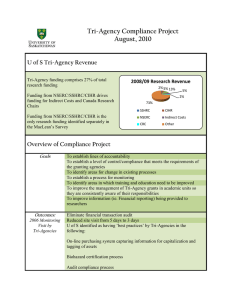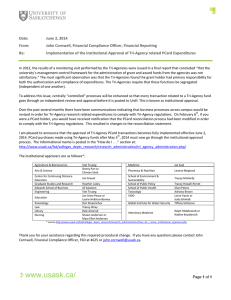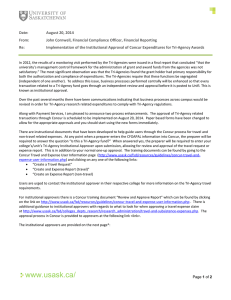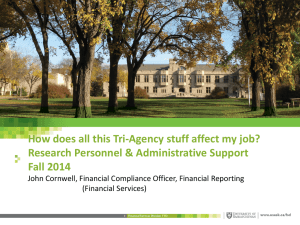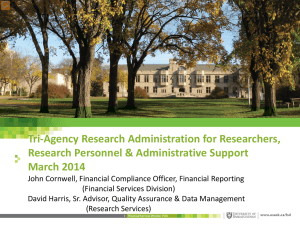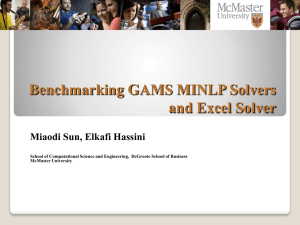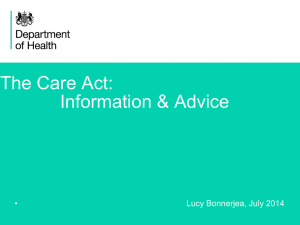Tri-Agency Monitoring Review - What can you expect?
advertisement
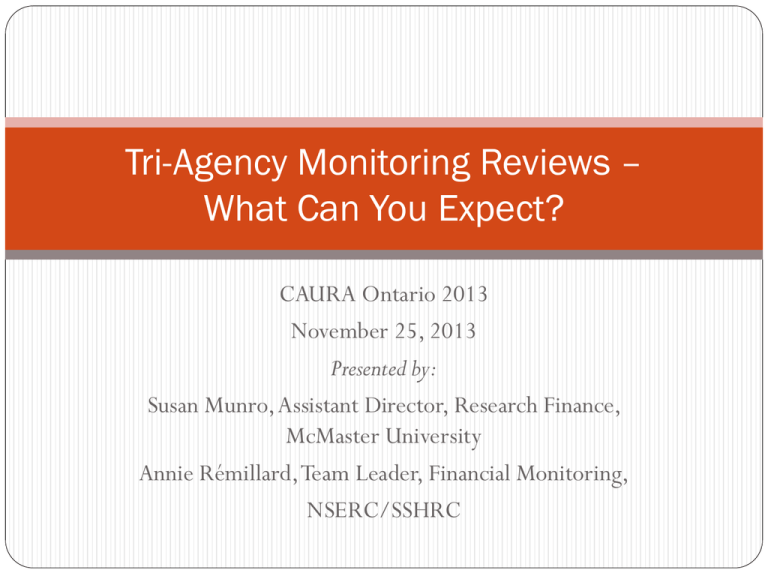
Tri-Agency Monitoring Reviews – What Can You Expect? CAURA Ontario 2013 November 25, 2013 Presented by: Susan Munro, Assistant Director, Research Finance, McMaster University Annie Rémillard, Team Leader, Financial Monitoring, NSERC/SSHRC McMaster’s Journey October 2009 Monitoring Review Countermeasures Process Re-engineering Working Groups: Bookstore Journal Entries Certifications Compensation Scientific Stores and Systems Contracts Compliance Officer Hired Semi-Annual Information Sessions on Tri-Agency Matters Continuous Internal Audits PeopleSoft Implementation Finance and Research Administration Go Live December 2013 Summer 2013 Monitoring Review McMaster requested to pilot modernized financial monitoring process Summer 2013 Monitoring Review Positive Findings: Clear Roles and Responsibilities Hiring of Compliance Officer Improved Oversight Responsibilities Involvement of Internal Audit Review of Signing Authorities Transition to ERP Improved Controls Needed: Strengthening of University’s role in its Review of Expenses for Compliance and Eligibility: Review of PI & Delegate Approvals in University Stores Lack of Written Justification for Equipment and Supplies Expense Reports – Purpose of Trip and Affiliation of Traveler Delegation of Signing Authorities to Administrative Staff & Sub-Delegations CIHR Research Allowances Account Set-up and Signing Authorities Oversight of NCE Overall: Excellent Progress Made Since the 2009 Review Tri-Agencies recognize all the effort, time and resources invested in improving systems and control framework The New Financial Monitoring Review Process Planning Stage • Communication of Monitoring Review Schedule Risk Assessment Questionnaire Reporting Stage • Communications • CIGT • Document Requests Execution Stage • Opening Meeting • Transaction Testing • Interviews • Closing Meeting The Planning Stage Initial Communications from Tri-Agency to Institution Role of Institutional Coordinator Notification Messages to Senior Management Collaborative Information Gathering Tool (CIGT) Timing Length (Full-scope vs. Scoped-down) Summary of CIGT Sections Policies and Procedures Tri-Agency Expectations on Level of Information Information and Documentation Requests General Ledgers Transaction Supporting Documents Request for Interviews The Execution Stage Official Opening Meeting Timing Attendance Agenda Interviews Coordination of Meetings Attendance Transaction Testing and Worksheet Debrief Meeting The Reporting Stage Detailed Assessment Report Design of the Report Remediation Action Plan Management Letter Follow-ups Tri-Agency Guidelines Clarification 2013 Tri-Agency Financial Administrative Guide (TAFAG) Summary of Changes Incentive Payments to Study Participants Transfer Letters Supporting Documentation: Justification for Electronic Equipment and Supply Purchases Network Centers of Excellence Institution as a Network Member NCE Program Guide TAFAG Institution as a Network Host Hosting Agreement Funding Agreement NCE Program Guide TAFAG Internal Policies of the NCE Next Steps Modifications to Tri-Agency Tools and SOPs Ongoing Communications with Institutions Publication of CIGT to all Eligible Institutions Adaptation of Monitoring Methodology to Eligible Colleges Thank You
